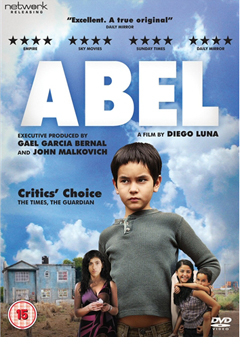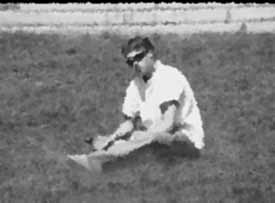 Film: Abel
Film: Abel
Director: Diego Luna
Cast: Jose Maria Yazpik, Christopher Ruiz-Esparza, Carlos Aragon, Karina Gidi, Gerardo Ruiz-Esparza, and Geraldine Alejandra
?I know who I am and who I may be, if I choose.?
?Too much sanity may be madness. And maddest of all, to see life as it is and not as it should be.?
Cervantes
Don Quixote as Oedipus Rex
Eight-year-old Abel, recently returned home after two years in a mental institution, decides he’s now the head of the house.
There’s a suggestion that his mental instability was initially brought on by the departure of his ne?er-do-well father. When Dad returns unexpectedly, Abel grants him the role of a visiting uncle and promises to find him a job and ?sort him out? with 75 pesos.
Abel’s psychiatrist insists that confronting Abel with reality would return him to a catatonic state, so the family maintains the charade, acquiescing to Abel’s demands as head of the house. The real father, needless to say, is becoming increasingly annoyed.
One of the most remarkable things about Abel is that he makes such a good dad. His father, the lazy, philandering tosser with an overweening sense of entitlement, shows that up in sharp relief. Under Abel’s ?care,? the family becomes more agreeable and cooperative.
But he’s still essentially a small boy, and the world is still big, frightening, and dangerous, full of barking dogs and great, blind machines. It’s even more dangerous when you’ve convinced yourself You’re capable of protecting your family from it all. For example, Abel promises his little brother Paul to teach him to swim, even though Abel himself doesn’t know how.
This film is so watchable because of the cleverly mapped-out network of conflicts. The characters are all carefully matched to the dramatic tasks the screenwriter has set up for them, and the conflicts in turn illuminate their characters, their bizarre encounters at once mocking and honouring the human condition.
As you would expect, such a premise sets up many hilarious scenes that are rendered even funnier because they have to do with psychologically perilous territory: for example, the scene in which Abel, believing himself to be his mother’s husband, lies on top of her. When she pushes him off, he hands her a candy cigarette and then has one himself.
Water in this film is an important symbol of psychological danger, death, and the submerging of a reasoning consciousness. Light, both real and artificial, is another symbol and a kind of messenger; the buzzing of electric lights signals mileposts in Abel’s consciousness as he seeks to defend his fragile, developing ego from a world that has become fearfully absurd to him.
Using madness as metaphor sometimes demands we be untrue to the harsh reality of mental illness (witness, for example, Don Quixote, Benny and Joon, and King of Hearts). It’s nonetheless a very effective vehicle for examining and plumbing the meaning of life.
Abel manifests six of the Mindful Bard’s criteria for films well worth seeing: 1) it is authentic, original, and delightful; 2) it provides respite from a sick and cruel world, a respite enabling me to renew myself for a return to mindful artistic endeavour; 3) it is about attainment of the true self; 4) it inspires an awareness of the sanctity of creation; 5) it displays an engagement with and compassionate response to suffering; and 6) it makes me appreciate that life is a complex and rare phenomenon, making living a unique opportunity.
Wanda also penned the poems for the artist book They Tell My Tale to Children Now to Help Them to be Good, a collection of meditations on fairy tales, illustrated by artist Susan Malmstrom.


